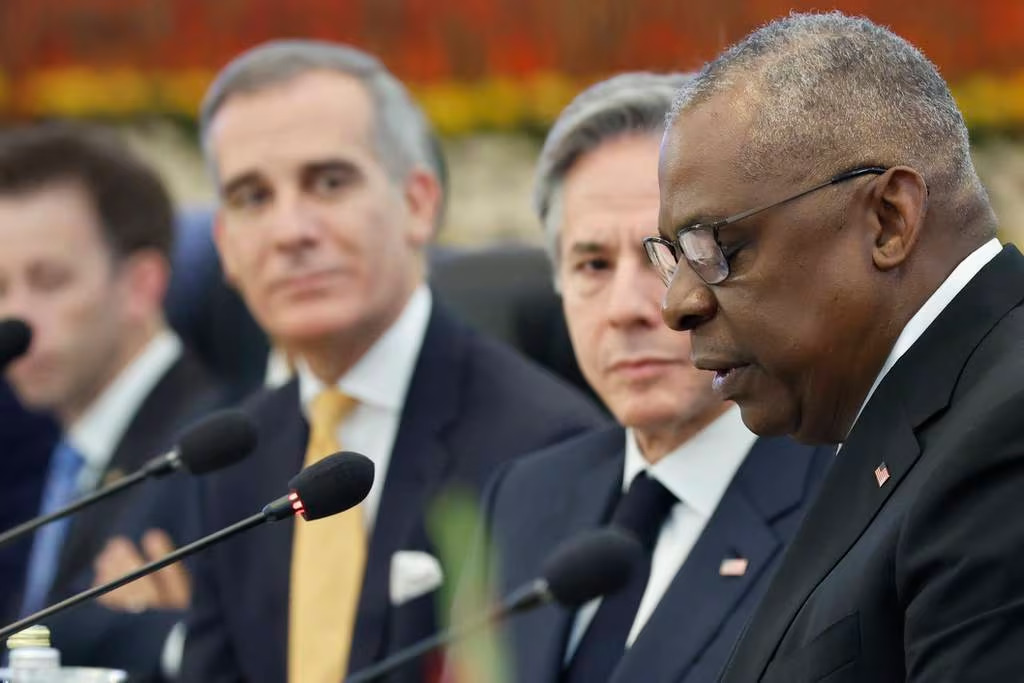India and the U.S. underlined their commitment to boosting security ties Friday as their top diplomats and defense chiefs met to discuss regional security, China, and the wars in Ukraine and Gaza.
U.S. Secretary of State Antony Blinken and U.S. Defense Secretary Lloyd Austin met with their Indian counterparts in New Delhi as part of an Asian trip aimed at showing unity over Russia’s war in Ukraine and preventing differences on the Israel-Hamas war from deepening.
Blinken said the U.S. and India were continuing to “deepen our collaboration on everything from emerging technologies to defense to people-to-people ties” and align diplomacy for “an Indo-Pacific region that’s free, that’s open, that’s prosperous, that’s resilient.”
He said the two sides discussed the crisis in the Middle East and “we appreciate the fact that from day one India has strongly condemned the attacks of Oct. 7. And as our joint statement makes clear, India and the United States stand with Israel against terrorists.”
Indian External Affairs Minister Subrahmanyam Jaishankar said the situation in the Middle East was a big concern. While India has condemned the Hamas attack on Israel, it balances its position by calling for talks on “a sovereign, independent and viable state of Palestine living within secure and recognized borders, side-by-side at peace with Israel.”
Blinken met with India’s Prime Minister Narendra Modi and “reaffirmed their shared vision for close partnership in the Indo-Pacific,” said U.S. State Department spokesperson Matthew Miller.
“They emphasized working together to address ongoing crises such as Russia’s war against Ukraine and the conflict in the Middle East,” Miller said.
Vinay Mohan Kwatra, India’s top bureaucrat in the foreign ministry, said India’s tense ties with China also were discussed at the official-level talks, but declined to give details.
India’s relationship with China has deteriorated since 2020, when Indian and Chinese troops clashed along their disputed border in the Himalayan Ladakh region, leaving 20 Indian and four Chinese soldiers dead. A standoff involving thousands of soldiers in the eastern Ladakh region continues, despite several rounds of military and diplomatic talks.
Blinken said he also discussed with the Indian side a diplomatic dispute that erupted when Canada alleged that India was involved in the assassination of a Sikh separatist in Canada.
Blinken said that the U.S. wants the two sides to resolve their differences in a cooperative way and urged India to “work with Canada on its investigation.”
The dispute started when Canadian Prime Minister Justin Trudeau said there were “credible allegations” of Indian involvement in the killing of Canadian citizen Hardeep Singh Nijjar in suburban Vancouver in western Canada. India rejected the accusation.
India and the U.S. have held so-called two-plus-two talks between India’s external affairs and defense ministers and the U.S. secretaries of state and defense since 2018 to discuss issues of concern and strengthen bilateral ties.
Austin and his Indian counterpart, Rajnath Singh, discussed a roadmap for defense industrial cooperation that will fast-track technology cooperation and co-production of defense systems, India’s defense ministry said.
“We’re integrating our industrial bases, strengthening our inter-operability, and sharing cutting-edge technology,” Austin said in his opening remarks.
Washington expects India to be a leading security provider in the Indo-Pacific region.
During Indian Prime Minister Narendra Modi’s visit to the United States in June, the two sides adopted a policy guide for defense industries to enable them to produce advanced defense systems together and collaborate on research and testing of prototypes.
The two sides reached an agreement that will allow U.S.-based General Electric to partner with India-based Hindustan Aeronautics to produce jet engines for Indian aircraft in India and the sale of U.S.-made armed MQ-9B SeaGuardian drones.
A joint statement at the conclusion of Blinken and Austin’s visit to New Delhi on Friday said the two sides reaffirmed their roadmap for defense industrial cooperation to strengthen India’s capabilities, enhance its defense production, facilitate technology-sharing, and promote supply chain resilience.
Source : Defense News


